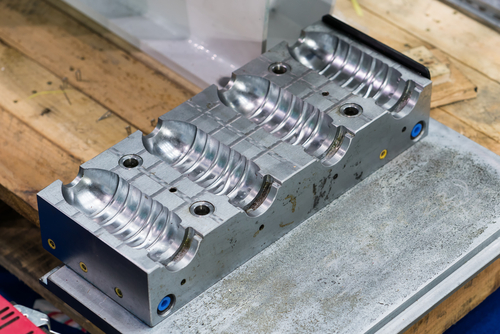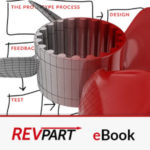
If you’ve been reading our blog for any period, you’ve likely noticed that we’re big proponents of seeking the right material for the right application (whenever such flexibility is possible) in spite of what “conventional wisdom” might tell you. In the world of manufacturing and plastic injection molding, there are more variables and, thus, more options than you might think.
You’re also likely familiar with the potential for aluminum injection molds instead of steel injection molds in certain scenarios, since the advantages of aluminum — in the right situations — have been broadly discussed regarding injection molding. Priorities and requirements are different for every project. In this piece, we’ll take a side-by-side look at some benefits and disadvantages of aluminum molds and steel molds for 10 key factors.
- Tooling cost. Advantage: Aluminum. When you look at the raw cost of having an injection mold manufactured, aluminum offers a clear advantage over steel in terms of lower pricing. Of course, the overall value and return on investment of an aluminum mold and a steel mold can vary greatly, based on the usage of the mold (for instance, the intended production lifespan, which we’ll take a closer look at shortly). Yet with all other factors equal, your initial tool investment will be lower for aluminum than for steel.
- Cost per part. Advantage: Toss-up. This factor depends on your intended production run, and the overall lifespan that you hope to get out of your part. For shorter runs, the lower upfront costs of aluminum molds can lead to lower overall cost per part. If you intend to use your mold for high volumes in the millions and tens of millions of parts, you’ll see the investment in a steel mold pay off. What’s more, the cost per part will decrease as you get a much longer service life. It’s critically important to plan how you’ll use your mold in advance, to get the greatest advantage in this area.
- Suitability for low volumes. Advantage: Aluminum. As mentioned above, aluminum molds will almost always offer better value for low-volume production runs — due to their lower upfront costs and ability to reliably produce parts into the thousands and tens of thousands of pieces. As always, review the specifics of your project to ensure that, for instance, aluminum is suitable for the material you’re using.
- Suitability for high volumes. Advantage: Steel. For molds intended for high volume and multiple production runs, a steel construction will typically be your better bet. Your higher upfront investment is rewarded with a piece of equipment that can reliably last for years with proper maintenance. The strength of steel is unparalleled for use in these types of longer production runs.
- Heating and cooling times. Advantage: Aluminum. With a much higher rate of heat dissipation than steel, aluminum molds can heat and cool much more quickly than steel molds — typically up to seven times. Cooling time, especially, makes up a significant portion of overall cycle time in injection molding. Thus, choosing an aluminum mold when appropriate can offer major benefits in cycle time which, in turn, means that you’re able to produce more parts more quickly.
- Suitability for advanced resins. Advantage: Steel. While both steel and aluminum are usually suitable for a broad range of standard injection molding resins, steel can offer an advantage if you’re working with more complex or advanced formulations — such as those reinforced with glass, fiber or other additives. A relatively softer metal like aluminum runs a greater risk of scratches or other damage from certain types of additives, which can affect the finish and texture of the final part. Be sure to review the compatibility for your resin of choice, especially if it includes additives.
- Shrink, warp and other defects. Advantage: Aluminum. The superior heat dissipation of aluminum means that the mold is better able to approach uniform heating and cooling times — and to do so more quickly — which provides an advantage in decreasing the number of defective and rejected parts. Non-uniform heating and cooling are among the biggest factors in defects such as sink marks, voids and burn marks. When used in the right application, aluminum molds can provide even better cost advantages due to lower rejection rates for parts.
- Ease of modification and repair. Advantage: Aluminum. Damaged or deformed steel molds can be tremendously difficult and costly to repair, due to the extreme hardness of the material. All too often, a new mold will be required in such cases. Aluminum molds are much more receptive to repair and, as a softer material, can be more easily modified in cases where production errors may have occurred.
- Suitability for detailed features. Advantage: Steel. When extremely fine, detailed features are required — such as those that push the boundaries of injection mold design best practices, e.g., thin, non-uniform walls, less rounded angles and tighter, narrower areas of the mold cavity — steel molds will often provide better results than aluminum. The strength and hardness of the steel means that it’s better able to hold a shape for those extremely high-precision areas.
- Durability. Advantage: Steel. The key benefit of steel molds is their vastly superior durability, over any other material available. When long production runs are expected, and the mold is intended for repeated use over many years, steel is the clear choice. The higher upfront investment required more than pays itself back over the repeated use and tens of millions of parts that the mold is capable of producing. Steel can also lower parts per cost far more than any other material allows. The flip side of this advantage is the risk of using an over-engineered solution for your application. Essentially, if you don’t require those long production runs and repeated uses, steel is less likely to prove a worthy investment.
As always, be sure to fully outline the requirements and specifications of your project before moving forward with manufacturing and material choices such as mold material. If you have any questions, RevPart is here to offer our expertise and help.


